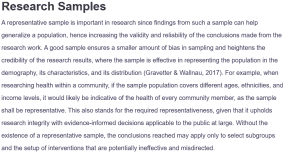Research Samples
A representative sample is important in research since findings from such a sample can help generalize a population, hence increasing the validity and reliability of the conclusions made from the research work. A good sample ensures a smaller amount of bias in sampling and heightens the credibility of the research results, where the sample is effective in representing the population in the demography, its characteristics, and its distribution (Gravetter & Wallnau, 2017). For example, when researching health within a community, if the sample population covers different ages, ethnicities, and income levels, it would likely be indicative of the health of every community member, as the sample shall be representative. This also stands for the required representativeness, given that it upholds research integrity with evidence-informed decisions applicable to the public at large. Without the existence of a representative sample, the conclusions reached may apply only to select subgroups and the setup of interventions that are potentially ineffective and misdirected.
On the other hand, a biased sample undervalues a community because of the exclusion of key subgroups, leading to skewed results that do not appropriately represent the diversity and needs of the population (Frankfort-Nachmias & Leon-Guerrero, 2018). For instance, in research about community development that does not involve higher-income neighborhoods, results might fail to consider those from lower-income areas and thus perpetuate existing inequalities or marginalization. This, in turn, leads to policy recommendations that are not correct or interventions that fall short of what the community needs; hence, the loss of trust and support in research initiatives. Further, biased samples can insinuate stereotypes or misconceptions about a community and damage the unity and shared purpose of the population. Thus, ensuring that samples are representative is not only a methodological issue but also an ethical concern that will further inclusion and help to create an accurate understanding of the community.
References
Frankfort-Nachmias, C., & Leon-Guerrero, A. (2018). Social statistics for a diverse society. SAGE Publications.
Gravetter, F. J., & Wallnau, L. B. (2017). Statistics for the behavioral sciences (10th ed.). Cengage Learning.
ORDER A PLAGIARISM-FREE PAPER HERE
We’ll write everything from scratch
Question
Discussion Post 7
- Why is it important that a sample be representative of the population it came from? Why would a biased sample not support the value of community?
Research Samples


